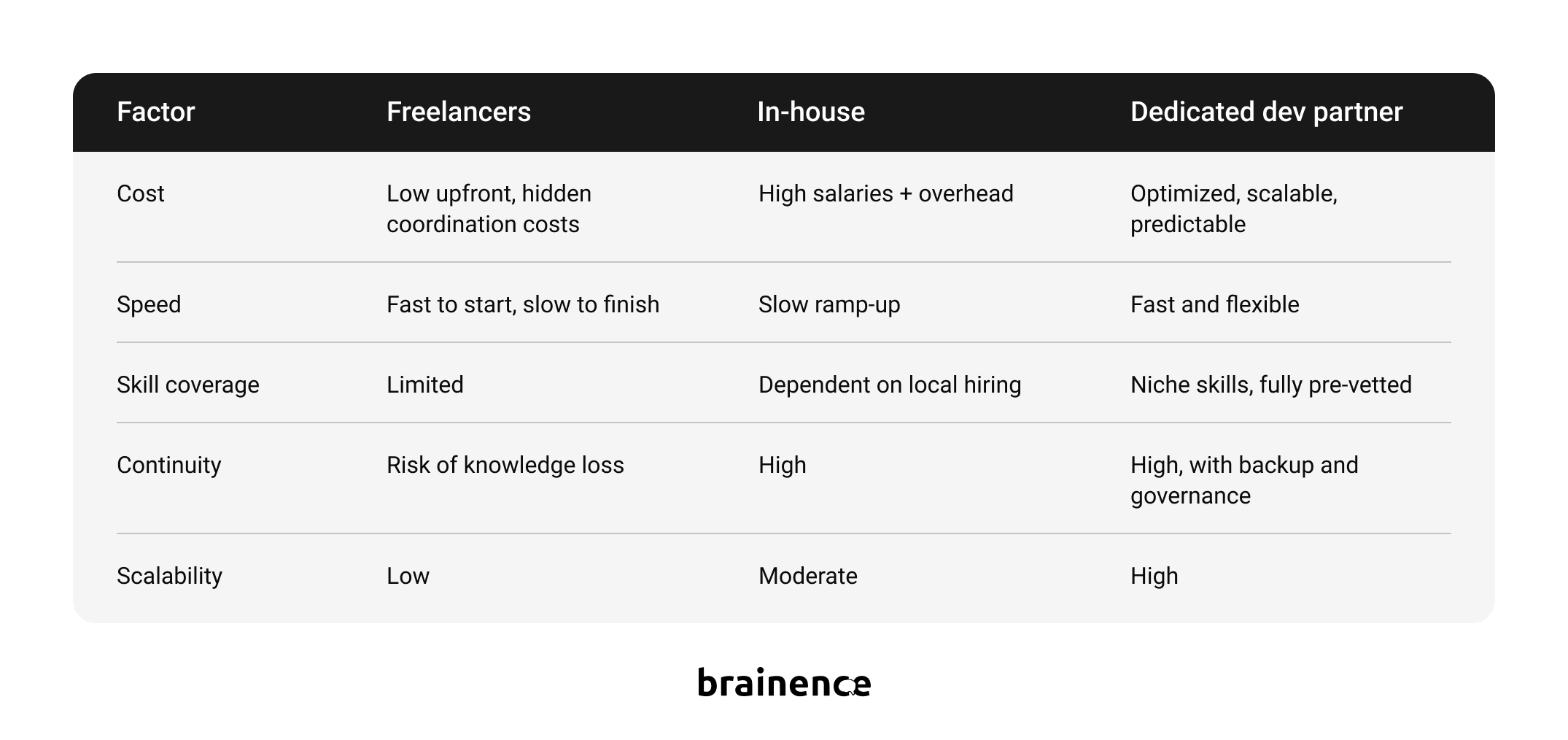23 September 2025
How to hire developers for a startup: Freelancers, in-house, or dev partner?
The fastest way to kill your startup? Hiring the wrong developers.

Solutions
Author

Anna Vasylko
Chief Bussiness Development OfficerIf you’re a CTO or startup owner, you’ve probably stared at a project plan and thought: “How the hell do we actually get this built?” You need speed, rare skills, and someone who won’t ghost halfway through a sprint. Meanwhile, your hiring budget is finite, the local talent pool is shallow, and deadlines are breathing down your neck. Welcome to the modern startup conundrum.
Startups can spend from 3 to 6 months hunting the right tech talent while the product waits. That’s months of lost momentum.
We at Brainence have worked with dozens of companies in this position (primarily in Canada, the UK, and Western Europe), and can say for sure: you’re not alone. If you’re hiring software developers for a startup, knowing the strengths and pitfalls of freelancers, in-house teams, and dev partners is everything.
Our COO, Anna Vasylko, has seen every hiring trap and every success where the right dev partner made all the difference. Drawing on hundreds of projects over her 12 years in tech (six of them spent growing Brainence), Anna shares insights on how to hire employees for a startup the smart way.
Table of contents
Talent shortages aren’t a myth
You might think the “can’t find developers” stories are overblown startup complaints. They’re not. I see it all the time working with founders: whether it’s scaling a fintech platform, a health-tech product, or a marketplace, the lack of qualified engineering talent is one of the most real — and painful — constraints you face.
You won’t like the stats: 77% of organizations say they’ve already been impacted by the IT skills gap, while 84% of decision-makers are concerned about finding tech talent in 2025.
Numbers are one thing, but the reality… Posting roles for senior DevOps, ML engineers, or front- and back-end specialists often gets you either zero qualified applicants or candidates who fail the technical or culture fit. I’ve seen teams scramble to cover gaps, leading to backlogs, delayed launches, and stretched roadmaps, and this, unfortunately, is a classic scenario when hiring programmers for a startup without a clear plan.
Why is it worse now, in 2025?
- Technologies are evolving fast: AI, ML, cloud infrastructure, real-time data pipelines, etc. Demand for engineers with those skills outpaces supply by a large margin.
- Remote work widened geographic options but didn’t close the gap. Top-tier talent still pick and choose, so “remote hiring” often means getting expensive senior engineers plus dealing with high salary expectations and competition.
- Companies are under pressure: faster product cycles, tighter deadlines, more internal complexity (microservices, security, scale). The demand for these skills outpaces supply, especially when you’re hiring software developers for a startup.
If you ignore these shortages, you pay the price: delays, higher cost per hire, turnover, technical debt from “plugging holes” with less-prepared developers.
First things first: define your project requirements
Before you even think about freelancers, in-house hires, or a dev partner, stop and answer the question: what exactly are you building, and what does it take to deliver it?
Sounds obvious, but I see startups waste months (and sometimes tens of thousands of dollars!) because they start hunting for “a good developer” without mapping the problem. Hiring developers for a startup in a vacuum is like buying parts for a car before deciding if you’re building a sedan or an off-road truck.
Start here:
- Scope and complexity. Are you shipping an MVP in three months, or building a scalable product with compliance and integrations baked in? The timeline and level of technical sophistication dictate very different hiring needs.
- Core stack vs. niche expertise. Do you need a generalist full-stack to validate the market, or senior engineers with AI/ML, DevOps, or Big Data chops to make the system future-proof? Defining the balance between “broad” and “deep” is critical.
- Critical integrations. E-commerce startups might need a Linnworks integration; fintechs often need KYC/AML; health-tech deals with HIPAA/GDPR. These are not skills you casually pick up in a weekend.
- Budget vs. runway. Not just “how much can you spend,” but “how much flexibility do you have if a hire doesn’t work out?” Freelancers let you experiment; in-house hires lock in fixed costs; dev partners absorb scaling risk.
Why am I emphasizing the obvious?
If your requirements are vague, you’ll mis-hire, and mis-hiring is worse than not hiring at all. It costs months of work, demoralizes teams, and usually forces you to start over.
Treat requirement-mapping as part of your “how to hire software developers for a startup” strategy. Once you’re clear on what needs to be built and where the risks are, choosing between freelancers, in-house, or a dev partner becomes a much smarter—and faster—decision.
Skip the hiring headache
Get first candidates in a week, a full team on board in 4–8 weeks.

Freelancers: fast but fragile when hiring developers for a startup
Freelancers are seductive. They’re cheap, flexible, and often available yesterday. Need a landing page, an integration script, or a proof-of-concept? Platforms like Upwork, Toptal, and Fiverr have thousands of developers ready to jump in tomorrow.
The upside is obvious:
- Quick to find and onboard. You can have code shipping within days, not months.
- Flexible costs. You pay per project or per hour, no long-term commitments.
- Wide variety. Whatever stack, framework, or niche you’re after, there’s someone who’s done it before.
But keep in mind: freelancers are mercenaries, not teammates. They solve a task, not your company’s problem.
Common pain points:
- Lack of continuity. Once the contract ends, so does their involvement. Future bugs? Someone else’s headache.
- Scalability issues. Managing five freelancers quickly turns into herding cats. No shared roadmap, no unified delivery process.
- Variable quality. Even “vetted” platforms can’t guarantee someone writes maintainable, production-ready code.
- Security and IP risks. With sensitive data, compliance obligations, or proprietary algorithms, trusting a rotating cast of contractors is a gamble.
That doesn’t mean freelancers have no place. For early-stage startups, they’re ideal for validating ideas, building prototypes, or testing features without over-investing.
Here’s my take from years of helping startups: if your goal is to hire developers for a startup and build a product that scales, freelancers can be part of the toolkit, but they should never form the foundation.
The long game of hiring in-house
Hiring your own developers feels like the most “serious” move a startup can make. Full-time employees mean commitment, culture, and control. You’re not just buying hours—you’re building a team that grows with your product.
The strengths are real:
- Cultural alignment. Your developers breathe the same vision, join stand-ups, and stay invested in the roadmap.
- Knowledge retention. Product quirks, architecture decisions, domain know-how—it all stays in-house, not with an external vendor.
- Long-term stability. If you’re planning for a multi-year product evolution, having a core engineering crew makes scaling smoother.
But you should always keep in mind that building an in-house team is slow, expensive, and unforgiving.
- Time-to-hire. In competitive markets, finding senior developers can take 3–6 months. Multiply that by every role you need.
- High fixed costs. Salaries, benefits, taxes, equipment, office space (if not remote)… your burn rate shoots up fast.
- Talent risk. If a key engineer quits, the knowledge gap can derail entire sprints.
- Geographic limits. Even in the remote era, companies tend to recruit within familiar networks or regions, which narrows the talent pool.
In markets like the United States, Canada, the UK, and Western Europe, salaries are among the highest globally. In Canada, senior software engineers pull a median of ~$129K, with top roles hitting $243K in 2025. In Ireland, a senior dev in Dublin with 10–14 years’ experience earns €107K–€124K per year. Add benefits and overhead, and total costs can easily climb 1.5–2x base salary.
Compare that to Central or Eastern Europe, where developers with similar skills can cost 30–50% less. For a scaling startup, ignoring this gap isn’t just naive. It’s expensive. Misjudge geography, misjudge costs, and suddenly your carefully planned hiring strategy blows through the runway before your MVP even sees the light of day.
I often tell founders that in-house teams are like tanks. Powerful, stable, but slow to maneuver. If you’ve got funding, need tight IP control, and a predictable roadmap, go for it. But if you’re chasing runway or niche skills on demand (think ML engineers for a feature, or DevOps to stabilize infrastructure), tanks aren’t what you need. You need something faster, more agile, and scalable. That’s where hiring software developers for a startup via a dev partner often makes more sense.
Dedicated dev partners: the Brainence approach
If freelancers are fast but fragile, and in-house teams are slow but stable, then dedicated dev partners sit somewhere in the sweet spot: speed without the chaos. Think of them as an extension of your team, not a vendor. They bring the specialized expertise you need, precisely when you need it, and integrate directly into your workflows.
Why this model works:
- Pre-vetted talent. You don’t waste months sifting through resumes. Every engineer is screened for both technical depth and collaboration fit.
- Flexibility at scale. Need three front-end developers today and two DevOps specialists next month? A dev partner adjusts without you going back to square one.
- Continuity and knowledge retention. Unlike freelancers who vanish after a project, dev partners maintain long-term engagement with your roadmap, so product knowledge doesn’t leak.
- Governance baked in. Structured reporting, sprint reviews, and process alignment ensure your team stays coordinated, even across borders or time zones.
Common fail traps avoided by dev partners:
- Assuming you can “just hire a freelancer and scale.” Freelancers are great for short-term wins, not maintaining complex, growing systems.
- Believing in-house teams can cover every niche skill. AI, Big Data, or specialized DevOps roles are hard to fill—and even harder to retain in-house without massive overhead.
- Ignoring integration overhead. A dev partner becomes part of your rhythm, reducing miscommunication and duplicate work.
Brainence’s POV: we don’t just provide developers; we deliver dedicated teams of niche senior talent that seamlessly fit into your environment. You get the benefits of full-time expertise, with the flexibility and speed you need to hit deadlines, validate products, and scale efficiently.
As a COO with 10+ years of experience, I can assure you that the companies that succeed are the ones that treat their dev partners as teammates, not contractors. When you do that, you can finally focus on building products and capturing markets, instead of firefighting recruitment, onboarding, and retention.
Hiring software developers for a startup: compare your options

The obvious insight often overlooked: “cheap” isn’t cheap, “full control” isn’t always worth the delay, and “flexible” rarely means seamless.
Common myths about dev partners, answered
Every time we talk about dedicated dev partners, the same objections come up. Let’s clear the air.
“But external teams won’t understand our product.”
It’s only true if you treat them like outsiders. Fix it with integration: shared stand-ups, common tooling, aligned sprints. A serious dev partner embeds into your processes. If they don’t, they’re not a partner, they’re an outsourcing agency.
“We’ll lose control over code quality and IP.”
This one’s about governance, not geography. When done right, you keep full control over contracts, NDAs, Git access, and code reviews. A partner’s job is to strengthen delivery, not dilute it.
“It’ll cost more than freelancers.”
On paper, maybe. In practice, no. Add up the time spent re-hiring, fixing inconsistent code, and plugging knowledge gaps when freelancers leave, and you’ll see the hidden tax of “cheap.” With a partner, continuity pays for itself.
“We want our own culture, not outsiders.”
Valid point if you’re hiring mercenaries. But dedicated dev partners aren’t “outsiders” in the traditional sense. They align with your rituals and DNA, while giving you the flexibility you can’t get in-house.
“We should just hire locally.”
You can try. But remember: senior engineers in countries like Canada, Germany, or the Netherlands command $120K–$150K+ base, and that’s before benefits. Factor in time-to-hire, and your product roadmap might stall before the team is even assembled.
Counterarguments are often true when you’re dealing with low-quality vendors. With the right partner, they turn into your competitive edge.
Stop guessing. Start building.
Still wondering how to hire employees for your startup? You’re finally in the right place.

Where to actually find and hire developers for a startup
Advice like “just use LinkedIn” is about as helpful as telling a drowning person to “just swim.” You don’t need generic lists. You need the actual places where strong developers hang out and where you can realistically hire them.
Freelance marketplaces:
- Toptal is a curated network of senior freelancers, but pricey.
- Upwork has a wide pool, mixed quality. Works best for quick tasks or MVP experiments.
- Fiverr Pro is less chaotic than Fiverr’s main platform, good for narrowly defined projects.
Job boards and career platforms:
- LinkedIn Jobs is still the global default. Paid ads speed things up.
- Stack Overflow Jobs — niche, developer-first.
- AngelList Talent — strong for early-stage startups and candidates open to equity.
Communities and referrals:
- GitHub — check active contributors in your tech stack.
- Dev.to is community-driven, often leading to hidden talent.
- Tech-specific groups: Reactiflux (Discord for React devs), Elixir Slack, r/devops on Reddit.
These channels are slower but deliver candidates with genuine passion and proven track records.
Agencies and dev partners:
Clutch and GoodFirms are the go-to directories for vetted dev partners. You can filter by location, stack, and verified client reviews. (Pro tip: if you’re already here, take a look at our Clutch profile to see how other founders rate working with Brainence. Real reviews beat polished sales pitches every time.)
There’s no single “best place” to find developers. The right channel depends on whether you need someone tomorrow, next quarter, or for the next five years.
Choose the model that won’t sink you
At this point, the choice is obvious, but only if you’ve been honest about your project needs, budget, and timeline. Freelancers are fast but fragile. In-house hires give control, but slow you down. Dedicated dev partners? They (we!) hit the sweet spot.
From my years leading client partnerships at Brainence, I’ve seen startups throw money at the wrong model, only to watch their runway vanish while the MVP sits half-built. Picking the wrong hiring strategy can stall your entire product roadmap.
Most startups burn 3+ months just to land one developer and half a year to build a team. That’s momentum and cash down the drain. Brainence plugs the gap in 4–8 weeks.
How else do we shine? We help you figure out how to hire developers for a startup and actually find your dream teammates:
- Pre-vetted middle and senior talent. We source, screen, and verify engineers with the skills your project demands — AI, ML, DevOps, Big Data, React, Node, .NET — you name it. Zero time wasted on unqualified candidates.
- Seamless integration. Our teams plug into your workflow, sprint cadence, and tooling. Our HR and account management teams handle onboarding and ongoing support, making sure both you and your team are happy and aligned every step of the way.
- Scalable and flexible. Need three engineers this month, five next? We adjust. Need to scale down? No drama, just results.
- Saving your budget. We help you avoid high local salaries and lengthy hiring cycles, while maintaining top-tier quality. Our clients across Canada, the Netherlands, and Ireland can attest to the results.
- Proven results. Hundreds of projects across healthcare, e-commerce, real estate, retail, and more. Verified client reviews on Clutch show how we help startups and scale-ups bridge talent gaps and accelerate product delivery.
 The Brainence team sending greetings from our headquarters
The Brainence team sending greetings from our headquarters
The wrong hiring model doesn’t just slow you down. It costs runway, momentum, and market opportunity. Brainence gives you first-class talent, operational agility, and predictable delivery, all without the headaches of recruitment or management overhead.
When you’re serious about building scalable, market-validated products, choosing the right dev partner is the move that keeps your startup afloat and actually accelerating.
Questions you may have
How do I hire developers for a startup with a limited budget?
When hiring developers for a startup, start with clarity: what exactly are you building, what tech do you need, and how fast? Picking the wrong hire burns cash, blows your timeline, and kills morale.
Freelancers are cheap and fast, but be aware: they may vanish when the going gets tough. In-house hires feel stable until salaries, benefits, and turnover sink your runway. And what about dedicated dev partners? They give you pre-vetted talent, flexibility, and continuity without the drama. Prioritize scope, skills, and timelines before spending a dime.
Should I hire software developers for a startup in-house or go remote?
Both options work, but in-house teams take longer to ramp and are expensive in markets like Canada or the Netherlands. Remote hiring widens your talent pool, but top-tier developers still pick projects selectively. Many startups find that a dev partner strikes the right balance: remote, pre-vetted, and integrated into your team.
Can freelancers handle complex startup projects?
Freelancers are great for early-stage work: MVPs, landing pages, or proof-of-concepts. Relying solely on them for complex, multi-layered products can backfire when hiring developers for a startup.
Compliance-heavy systems, scalable architectures, and niche tech stacks require continuity, governance, and deep expertise that freelancers often can’t provide. Knowledge gaps, inconsistent code quality, and coordination headaches slow delivery and risk your product roadmap.
For founders and tech leads learning how to hire software developers for a startup, freelancers should be part of the toolkit, never the foundation. Combining them with in-house hires or a dedicated dev partner ensures speed, quality, and scalable results without mis-hires or costly delays.
How do dev partners differ from outsourcing agencies?
If you’re exploring how to hire developers for a startup, understanding this difference is crucial. Traditional outsourcing agencies often treat your project like a list of tasks: hand off the work, get it back, and hope it fits. You might get code, but rarely continuity, alignment with your roadmap, or engineers invested in your product.
Dedicated dev partners, however, act like an extension of your team. They embed into your workflow, join stand-ups, participate in sprint planning, and align with your long-term goals. For founders and tech leads hiring software developers for a startup, this means every engineer is pre-vetted for technical depth and collaboration skills, so you avoid months wasted on recruitment or fixing inconsistent code.
Knowledge retention is another key advantage. Unlike outsourcing, which ends when the contract does, dev partners maintain long-term engagement. Product knowledge, architecture decisions, and integrations stay with the team. Governance (structured reporting, quality checks, and aligned processes) ensures delivery stays predictable.
For founders hiring developers for a startup, dev partners combine the speed of freelancers with the accountability and expertise of in-house teams. You get niche skills — AI, DevOps, Big Data — without the delays, mis-hires, or turnover risk.
How to avoid mis-hiring when hiring developers for a startup?
Mis-hiring is one of the fastest ways to drain your runway and stall growth when hiring developers for a startup. Map your project requirements first: scope, complexity, tech stack, critical integrations, and budget. Decide whether a freelancer, in-house hire, or dedicated dev partner fits each role. Mis-hiring can cost months of work, frustrate your team, and create technical debt that slows product delivery.
By taking a structured approach, you reduce risk, align hires with your roadmap, and ensure your team contributes effectively from day one. This is essential guidance for founders learning how to hire software developers for a startup efficiently.
Contact us

The most impressive for me was the ability of the team to provide first-class development and meet all the deadlines.

The team proactively comes up with solutions and is eager to deliver high-quality development support.

I was blown away by the knowledge that Brainence has about web app development, UX and optimisation.



